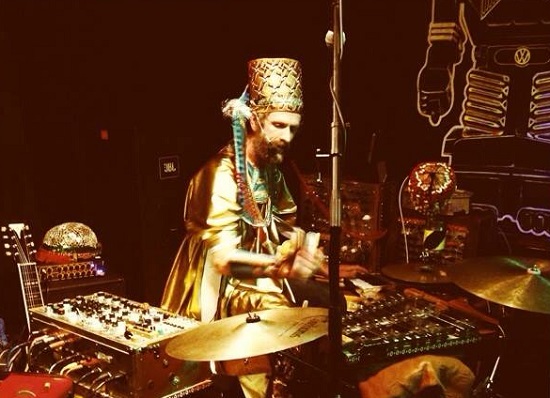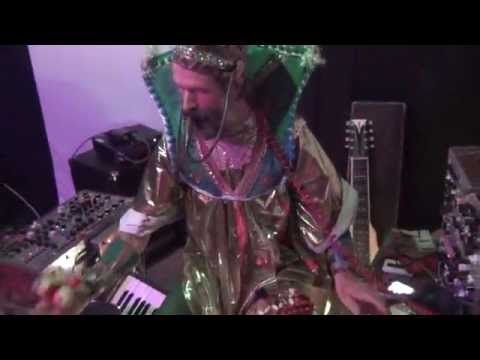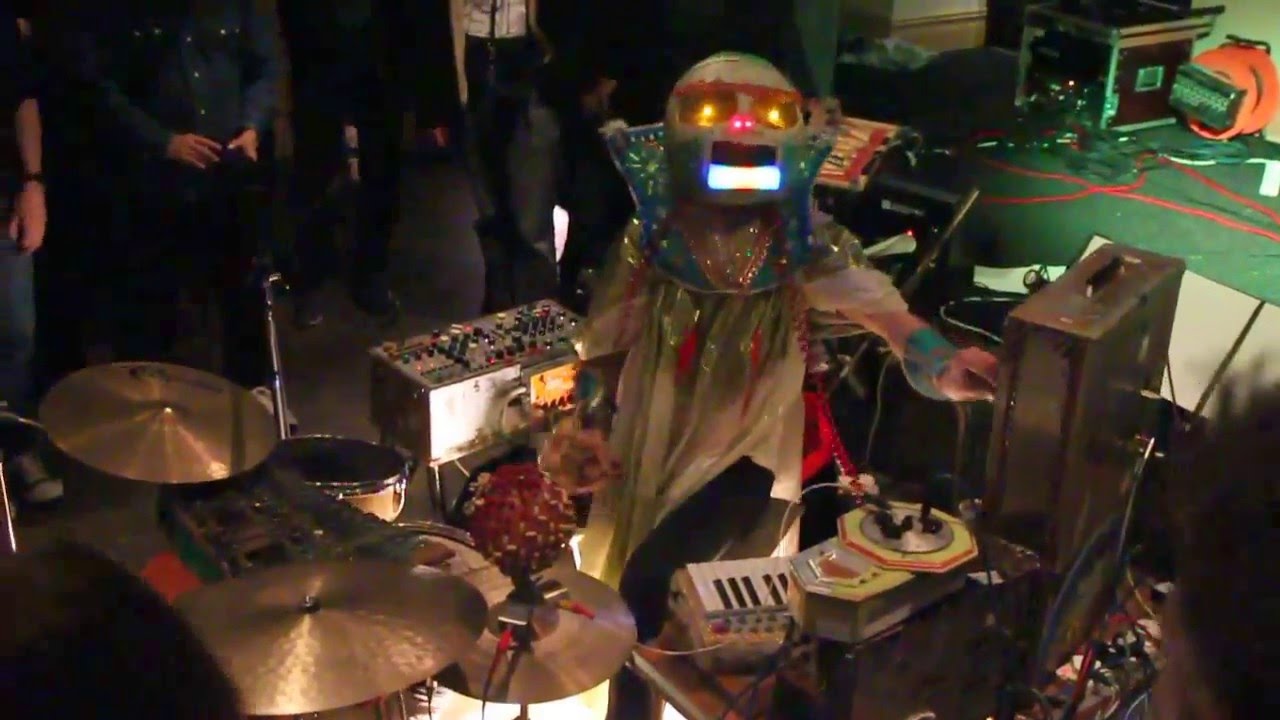Paddy Steer is tired but is doing his best to make an effort for the interview. Driving from Lille to Glasgow, his car broke down eight miles outside of Glasgow, and the promoter had to come and get him and tow him with a climbing rope to the venue.
He finally got back to Manchester at nine in the morning. But nevertheless, in his attic studio, he is wearing a bobbly military helmet with lights around it, and is sat next to a beautiful oil wheel lamp, that distractingly but reassuringly emits psychedelic red hues in my direction throughout our conversation.
A bit like his live shows, he is endearingly rambling and ramshackle in conversation, yet everything just about makes sense, because every sentence is thoughtful and full of warmth.
Like a Mancunian Moon Dog, Steer has been a key player in the city’s musical underground since the late 1980s having played in the post punk band Biting Tongues with Graham Massey. He would also reappear with Massey in a touring version of 808 State and Toolshed. He was in the soul group Yargo, whose song ‘The Other Side Of Midnight’ was the theme tune to Tony Wilson’s Granada TV show of the same name, not to mention live bassist in Justin Robertson’s Lionrock and as a member of the Ninja Tune act Homelife, who released six albums between 1998 and 2009.
In January of this year Paddy Steer released his third solo album, Bifurcation Arrows, Misleading Visuals on Paraventricular Nucleus Recordings; an album which he wrote, produced and engineered, which also features him playing drums, clavinet, pianet, glockenspiel, percussion, timpani, banjo, double bass, bassoon, guitar, guitar synthesizer, bass, synth, violin, omnichord and xylophone, not to mention vocals. This album, like a lot of his work is largely unclassifiable but is loosely affiliated with Balkan brass band music, jazz fusion, acid jazz, cosmic, lo-fi indie and noise.
Tell me a bit about your costumes.
Paddy Steer: Well I have a bit of a surplus at the moment, because we did have a twelve piece Sun Ra homage band called The Part Time Heliocentric Cosmo Drama After School Club. It was a labour of love and we made some costumes for it. I’ve done gigs in plaid shirts, and it’s like, "Oh well which plaid shirt shall I wear? Are these jeans alright?" It just takes the thought out of it. I used all hate all that shite, management buying you a poncy shirt to wear, I would rather chuck on a sweaty golden piece of cloth.
In a way does it make you less self-conscious? Do you feel like you are in character or are you just being yourself but covered in Taffeta?
PS: Yes, costumes do take that pressure off especially if you’re not into street cred wear, I’m more of a practical warm fleecy, high waisted trouser man. I also like to employ a bit of a Brechtian/anti-Wizard Of Oz philosophy. I like getting changed on stage and taking my sweaty stuff off so folks can see I’m just a balding 51-year-old bloke with a load of cables to tidy up. I’m not totally covered in taffeta by the way, just my cuffs and pointy collar thingy, whatever it’s called. It’s not particularly that I’m in character either. I see people start to laugh when I put the foul smelling mouldy costume on, and that’s surely a good thing.
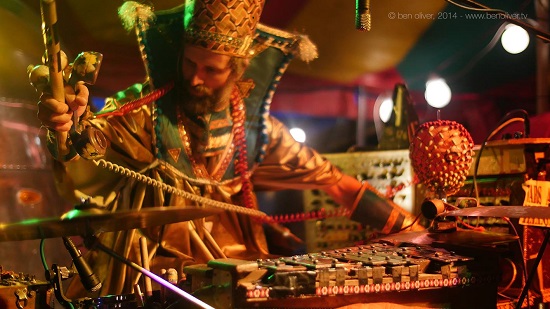
Photograph courtesy of B. Oliver
Do you make them yourself?
PS: Oh yeah I couldn’t imagine taking up anyone’s time to make them. It’s not hard. Like anything I do, it’s not that precise. Basic functionality. It’s just something to do with your hands, it’s not mystical.
What’s the helmet made out of?
PS: It’s just papier maché over a punchbowl.
It reminded me of Frank Sidebottom but I didn’t imagine he was an influence.
PS: Not at all. The Replacements wear helmets, but it’s more to do with Sun Ra.
Tell me about your setup. Is a lot of it built by yourself?
PS: Yeah most of the analogue stuff is built myself. A lot of it is stuff from Music From Outer Space, which is a guy called Ray Wilson, I’ve put together the circuit boards. Some single board synths with LFOs and Oscillators on and one modular synth. Some Thomas Henry percussive synths, a Paia Drum Tone, and then pretty much delays on just about everything.
What was connected to the drums?
PS: It’s the Mega Percussive Synth that’s attached to the high hat and bass drum. I’ve also got the electric glockenspiel through a couple of Octave Fuzzes.
Is the setup now something that has built up over time as a solo performer?
PS: It’s been about five years and is subtly changing, but is pretty much staying the same shape now.
Are you performing primarily as a solo performer these days?
PS: Yeah. I’ve done big bands, it is an amazing experience but it’s easy being in my own house, I can rehearse, I can potter, you can spend all your time doing the things that you do, you don’t have to wait for the couple of hours that ten people can show up. I can put all the time into this, and that’s what I want to do. I don’t expect people to do my stuff for free, I’m not at the point where I can pay people, and I don’t want to put people out.
Are you a full time musician?
PS: Yeah, I’ve avoided real work. It’s busy at the moment. It is surprising being fifty one and being the busiest I’ve ever been in my life. I mean, I’m not making a fortune, but it’s a living and I’m not having to do cabaret. I can confuse people, and make them run away screaming and covering their ears and I get paid for it, then that’s a good thing.
What’s the response like at gigs? Generally people seem to have a great time, but do you get much bewildered looks?
PS: I generally don’t look up when I’m playing, just in case there’s a problem with my knobs. I played in Lille last week in front of 1,000 people in a big hall, and got a short clap and then silence, and so then it’s just, ‘OK, you’re not a very lively bunch.’ It was probably a little bit lost in translation I think.
In terms of music, was punk where a lot of it started?
PS: Punk got me into music but I’ve never really played what you would refer to as punk. The ethos is more important to me than the sound.
What kind of music do you generally listen to?
PS: At the moment I am into Pedro Santos’ Krishnanda. On my big listening sessions, when I’m driving for seven hours – I call it a ten album drive – can be everything from Edith Frost, Gillian Welch to Bruce Haack and Sun Ra obviously. Phil Cohran. Shuggie Otis. King Sunny Ade’s early years – the stuff with the out of tune guitars; I love those rambling 15 minute structures. Eric Dolphy. Then anything from Japanese TV adverts to Thai rock music, and jazz, especially the really passionate heavy and rich stuff like Mingus’ Let My Children Hear Music.
People expect I’m into lots of electronic music, but I’m not really. I lose interest in electronic music. I like melody, I like natural textures, like Mingus. I like the intensity of music, that’s what gets me, the emotional breadth of music, and the variety of it. For me sometimes the emotional intensity can just come across in a melody, or a lyric, not always just a macho loud and powerful thing (but sometimes in that too).
Even though what you play is electronic, are you trying to reach the organic emotional levels of jazz in what you do?
PS: I don’t see what I play as being electronic. If you listen to the recordings I make, they’re full of horns, some violins, flutes double basses etc. My latest has me straining both my arse and my mouth on my bassoon. (I think I’m lacking in a certain technique.) If you can play a couple of notes on any instrument, then it’s enough to throw at a tune and give it another colour.
How did you make music in Homelife, was it all very fragmented and then you would piece it together or was it practised as a band and recorded in simple takes? Now you do things on your own has the process of how you made music in Homelife influenced what you do now or have you completely reacted against that?
PS: The music I made in Homelife did mutate, but was generally started with myself and Tony Burnside or myself and Simon King, then we’d augment writing and recordings with the musicians who played live with us. It was a sort of a Mr Potato Head experiment of arranging. When the recordings were completed, then we’d rehearse with everybody.
Homelife has totally influenced what I do now. I loved the colour of the band live especially when it was at its maximum of 12 people. I loved the strings, multi percussion, multi guitar, multi-instrumentalist singers, multi horns, and how the backgrounds and ages of everyone involved were varied. It also taught me that running a band was hard and eventually became a bane, and so just to avoid mental frazzling we stepped it down to a seven piece and then down to me and Tony, and then stopped. After a while I missed the colour and tried to think of a way that would enthral people again, but not in the same way. The building of synths and electric shaky balls and various other adaptations like the glockenspiel fitted with humbuckers (it’s so loud now… it was a problem instrument to mic up live in Homelife) have allowed me to present a set of possibilities, usually by way of about 40% bum notes.
When you record music now, are you conscious of how you are going to play it live as a one man band? Or do you see the recordings and live shows as completely separate things and are happy that they won’t sound the same because you have only have four limbs?
PS: Yes they are separate. I might acquiesce at some stage and make a live recording but only if I reckon I can play with less than 10% bum notes. But I think it’s best to treat it generally as a life affirming "You should really be at a gig" tease. Limbs-wise the electric shaker gives me a possibility of playing 16ths while playing the glock, or other parts of the kit. I’m working on my pressure sensing resistor between my buttocks (bumtroll ™ or bumwah™) at the moment. These are two of the biggest muscles can provide a lot of pressure when used correctly.
Can you tell me a brief history of Yargo, how you got into it, what it was like? How did you get the theme tune for the Tony Wilson show?
PS: I was the baby in Yargo by ten years so I always felt pretty patronised, and formed my wariness of egocentric singing landlords. I don’t know how the Wilson thing happened, I wasn’t particularly bothered.
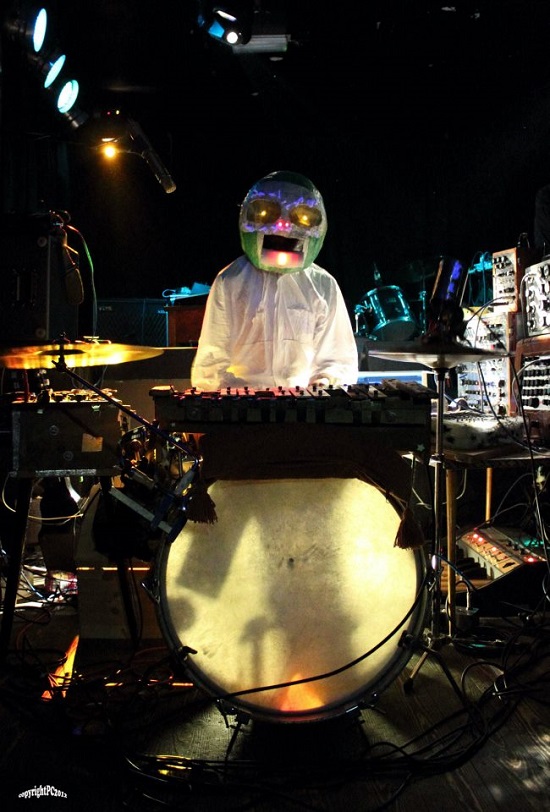
Photograph courtesy of Pauline Clark
There are not many interviews with you online, and from reading what I could find, there is a sense that you are a bit of an enigma or a recluse, but that isn’t the feeling I get from speaking to you.
PS: I’m not really a recluse, I just don’t pay any press people. If people don’t write about you then you’re slightly under the radar. My next door neighbour is not a recluse, but he’s not in the newspapers all the time. I just want people to make up their own mind. I mean gigs with a band maybe twenty years ago you could be playing in front of 30 people one week, then you are on the front cover of the NME and then you are playing in front of 500 people, you’re the same band, so it’s just up to the people to decide, but err, I don’t really know what I’m getting at here. I don’t like reading press, it gives me the willies. It’s nice not to really give a shit.
You never read reviews?
PS: Yeah we did, it was nice to get good ones, but they were often misrepresentative or a bit pointless, and even the good ones didn’t increase sales. The worst ones were the ones that just said it sounded like world music. So yeah, I just wanted to get on with the music.
Paddy Steer plays at Paper Dress in Hackney, London on May 24 and at The Railway, Winchester on June 25

